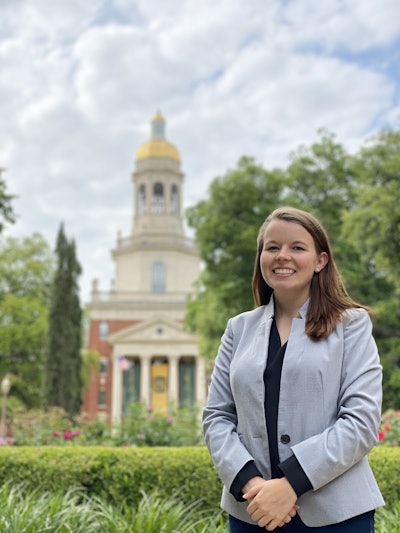Having recently started as a postdoc at Duke University, I had time to reflect on my job search process last year. While my final year of my Ph.D. was undoubtedly a challenge, including finishing a dissertation, teaching full-time, and leading our graduate student government, among other items, the job search was, undoubtedly, the most traumatic part of my final year. I am not alone; indeed, research has found that doctoral students’ well-being decreases during their program. Given the changes that COVID-19 has brought to higher education on the whole, and specifically the higher education job market, many individuals are in a panic about the academic job market during a recession. Even though many colleges and universities are making changes to career service centers in this time, I wanted to use this space to discuss the privileges I had participating in a job search and ask hiring committees to make changes to traditional hiring practices to move toward a more equitable model.
The search process for me was similar to many scholars; I applied to over 60 positions across the United States, knowing that each position could have hundreds of applicants. The majority of these were tenure-track positions, with a handful of postdoctoral and lecturer positions thrown in. As is typical, I began my search during the early fall semester, applying to positions from August through January and interviewing from November through February. It was in three main areas where I saw issues with privilege during the process: time, flexibility, and money.
 Dr. Rachel Renbarger
Dr. Rachel RenbargerTime
Applying to academic positions is incredibly time-consuming. In the beginning of the application process, each application took 2-3 hours. This included finding positions, collecting position information, gathering materials, and tailoring each to the position. For over 60 positions, this time requirement took no less than 100 hours.
Incredibly, this time commitment became even worse once I heard from search committees. From my 60+ applications, I had 10 institutions request initial interviews and then follow-up interviews, with 3 of those institutions requesting on-campus interviews. (I did not participate in all of these before I took an offer although I will discuss this in the flexibility section.) The majority of the initial interviews were 20 minutes long, but some wanted 40 minutes. Some wanted an initial interview and then follow-up video interviews. This time commitment excludes the time required to prepare for the interviews such as researching the department or preparing answers to common interview questions. If you include that preparation time in the process (which you should), initial and follow-up interviews would take another 40 hours or a full week of work.
For on-campus interviews, the preparation time was also spent coordinating dates, hotels, and travel information with office managers. You needed to travel to the place, spend an entire day with the department faculty and administrators, and then travel home. For my trips, I lost an average of 2.5 days per visit. The time sunk into the process thus far has now equated to over an entire month of work lost over the course of 7 months.
These requirements burden already time-burdened scholars, ones who are also teaching, grading, researching, and taking care of themselves and loved ones. In order to respect their time, hiring committees could streamline the application process, requiring fewer documents for the first round or make it similar to medical school or psychological internship matching systems that require one application and meet the needs of individuals and institutions simultaneously. Using out-of-date portals that require applicants to fill in information when the CV has all necessary documentation also wastes hours and benefits no one. At the interview stage, committees should allow for alternative formats (phone rather than video). Committees should also give clear expectations such as interview questions and interviewer information so applicants can prepare adequately. Work with the Human Resources department to implement time-saving strategies for both the applicant and the committee.
Flexibility
Search committee members know they have the advantage in hiring. The job market as it is allows them to demand great flexibility of applicants. On one occasion, a search committee asked me if I could fly out for an on-campus interview the next week. Another asked me, while knowing I was at the doctor for flu-like symptoms, if I could interview later that morning. Two expected me to reschedule or cancel the night classes I taught so that I could go to dinner with faculty. No one asked me if I had needs during the day, such as pumping or praying, that required schedule accommodations. Surely if I was interested in the position I would drop everything! (I did.)
Now that COVID has changed everything, flexibility can be even more difficult and should be demonstrated by hiring committees rather than just applicants. Rather than expect applicants to be available within a week of notice, timelines should be posted from the beginning so any applicant knows what to anticipate and can plan accordingly. Being flexible on the part of the committee may involve night or weekend time slots to cater to applicants who have other jobs or caregiving responsibilities. Additionally, all committees should be proactive in accommodating potential faculty members who have disabilities.
Money
Finally, money was a large, unspoken barrier. None of the institutions paid for my flight, food, or incidentals in advance. None even offered. I drove to one of the campus interviews, and there was no mention of covering gas or meals. I had to buy internet to teach in my hotel room, which was an unexpected and non-reimbursed cost. As a first-generation and low-income student, I had no idea what was “normal” and felt the need to pretend in case my money questions would be seen as bothersome.
Even before this recession, doctoral student financial issues were well-documented and students continue to face financial difficulties during COVID-19 as well. Hiring committees should take care to avoid adding any up-front expense for an applicant. Because of the pandemic, travel is currently limited, making this issue avoidable. However, hiring committees should not revert back to the typical ways of hiring once travel is safe. While there are undoubtedly benefits to having applicants attend and interview at certain conferences or interact with different aspects of campus, there are creative ways to recreate this experience virtually. Maintaining virtual applications can be one way hiring committees seek to alleviate financial concerns of the applicants during a pandemic and after it is gone.
Of course, there were more privileges that allowed me to participate in this search circus. Institutions should identify other areas of weakness and continually address the needs of applicants, especially as the pandemic continues to change the higher education landscape.
Dr. Rachel Renbarger is a postdoctoral research associate at Duke University.















